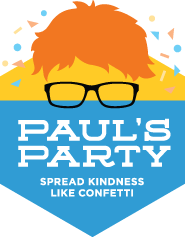Of all the things Paul had to endure, I think seizures were the worst. They were random and could occur at any time, so they affected everything we did and we had to think about them any time we planned anything. School, vacations, and even just a trip to the grocery store had to be planned out, just in case. Paul had his first seizure in 2005, when he was 4 years old, and it was the scariest thing we had experienced, and we had experienced a lot by then.
Paul usually could not feel them coming on. If we were hanging out together we had to keep checking on him, because they usually started as “absence”. He would just not respond. This got to be very irritating for Paul. I would be doing something mundane, like folding the laundry, and would ask Paul (watching TV or whatever) if he was OK. He wouldn’t answer. If you had kids, you know this is actually a normal response and 99% of the time he was just too lazy to respond. I had to walk into the room he was in and say it louder to make sure he actually was OK. It could get frustrating, except I was relieved he was just irritated, if that makes sense. After a while he got good at letting us know he was ok.
We tried a few different medications before we found one that worked. If you, or someone you love, has seizures, I can tell you that they have great tools to control them, but it takes time to dial things in. Over the course of 3 or 4 years, we found the medication and dosage that worked, and Paul was able to go long periods of time without having a seizure. The only way you figure that out is by expecting a seizure each day, and if he didn’t have one, you might be on the right track.
Paul’s seizures were a little different each time. He probably had a total of a few dozen big ones and many little episodes. He could stare off into space and be unresponsive, or he could go into full convulsions. We learned how to keep him from choking and manage until it subsided. We learned to give him valium if they lasted more than 3 minutes, to prevent him from having a life-threatening episode. When we first got this med it was administered rectally. He had some major seizures and we had to do that a few times. I thought this was especially cruel, not only was he helpless and convulsing, but no matter where we were, we had to pull his pants down to medicate him. Eventually they came out with a nasal version and that made things a tiny increment better. He was so unbelievably courageous and resilient through all of this. It was just how it was, and he dealt with it.
Then he got on an anti-seizure med that seemed to work, although he was on the maximum dose. A side effect was a mental dullness that we hated, but we would do anything to get away from seizures. Gradually, after a few years, he had seizures less and less, until we felt like we could reduce the levels of the medications. After a few months of that we got off the meds completely – he had grown out of the seizures. He was about 11 years old.
Paul at times could be cognitively “normal” for his age and grade, and at time he was diagnosed with huge delays. The hardest part was walking the line between helping him survive and trying to give him the opportunity to be the best he could be. Kathie and I made this judgement call many times in Paul’s life, and the seizure issue illustrates it most clearly. Stay on the meds and play it safe, even though it has long term effects, or keep pushing to get him off so he can learn and experience. I am proud of the fact we got him off those meds! Parents of special needs kids make these calls all the time and it causes far more stress than lack of mobility or other more visible issues.
That time, for us, I think it was the right call. I am sure we made the wrong call a few times also. Sometimes I wonder if we pushed too much on some stuff so he could live a real life, but it does not keep me up at night. Whatever we faced, we worked hard to get as much information as we could, and then did the best we could with the information we had. The medical landscape changed dramatically for SB kids during the time that we were raising Paul. What was best practice when Paul was born is now not done at all in some cases now. We all learned together and I am grateful that he is not threatened by seizures, or any other of his issues anymore. The only regret is that we couldn’t figure out this one last thing. I would love to still be in that fight, trying to figure out what to do next.
